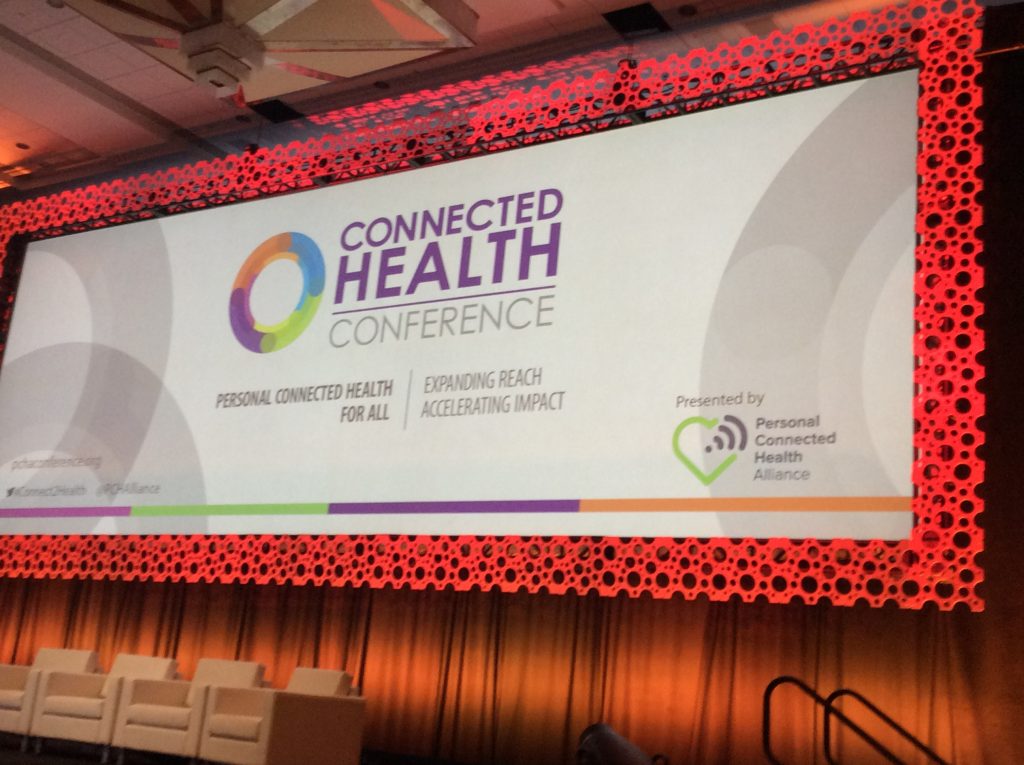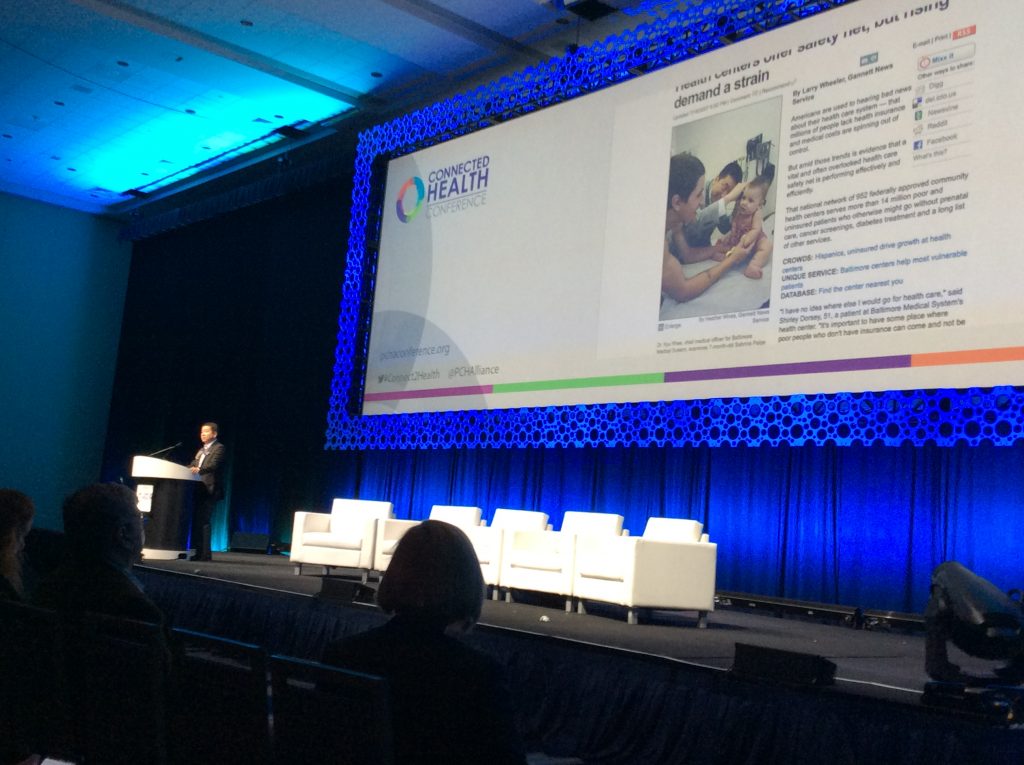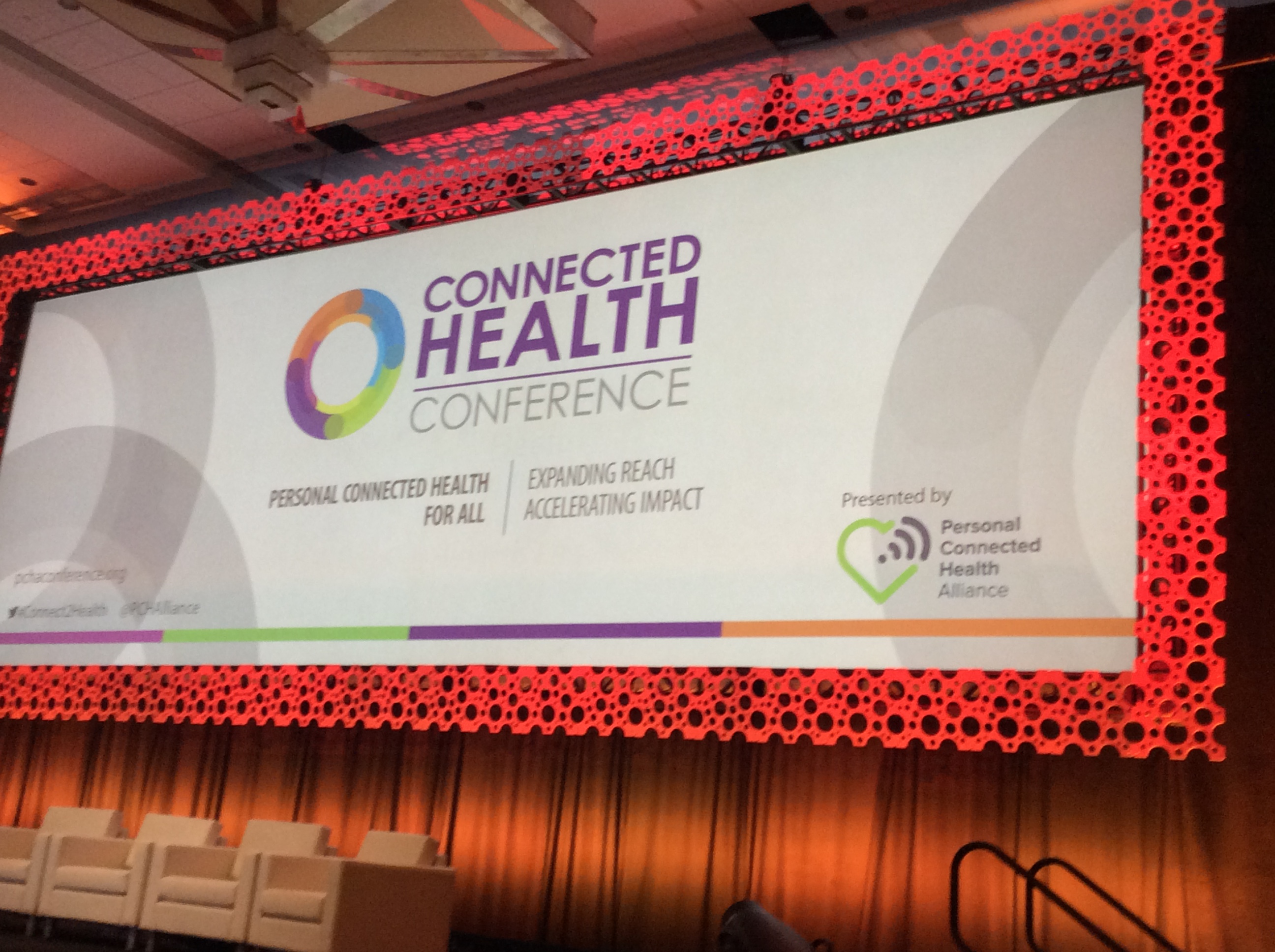
“Because health is personal” is the tagline at the 2016 Connected Health Conference being held at the Gaylord Resort in National Harbor in metro Washington, DC.
“Personal,” “Connected,” and “Health” are the three words that comprise the adjectives in the Personal Connected Health Alliance, the host of this conference. PCHA was formed through the merger of HIMSS, the health IT association, and Continua, the organization advocating for health technology “interoperability” — the ability for digital and communications technologies to communicate with each other, to remove friction from health data exchange. This week, PCHA announced that it will bring the Wireless-Life Sciences Alliance into the organization. PCHA has further strengthened its position by merging in the Partners Connected Health Symposium, which has been led by Dr. Joe Kvedar, VP, Connected Health, Partners HealthCare. Dr. Kvedar is receiving the Digital Health Innovation Award during this conference, as well. Joe has been a pioneering clinician in the field of digital health for twenty years.
In her introductory remarks for the Conference, Patty Mechael, who leads PCHA, talked about the “vision to make health and wellness an effortless part of daily life. Health is personal,” she said, and, healthcare is in desperate need of a rethink.”
She added that this moment is the opportunity for, “a revolution not just in medical treatment and technology but in the way we think about health itself.” Mechael expects a re-focus from doctors, drugs and delivery systems to the “everyday choices we make” as health consumers.
Four forces are converging bringing about the personalization of health, according to Mechael’s read of the market:
- Advancement and proliferation of personal connected health devices
- Consumerization of health
- Cost – not just in terms of money but recognizing the toll that poor health takes on each of us and our loved ones; and,
- Genomics and the CH movement to precision medicine – or, as public health people say, “precision health.”

“There are things humans do well and things machines do well,” noted Dr. Kyu Rhee, Chief Medical Officer at IBM and a leader on the Watson Health team. Welcome to the cognitive era of computing, Dr. Rhee explained, where information technology and data come together to help people better understand, reason, learn, and interact making previously invisible data and knowledge visible and actionable. In health and healthcare, that will be transformational.
Dr. Rhee discussed the importance of the social determinants of health that go well beyond healthcare data. “HEALTH,” he coined, can be an acronym for housing, education, access to services, labor (good jobs), transportation, and healthcare services, among other inputs that fall outside of a person’s given gene pool. Your zipcode can be a more potent determinant of your health than your genetic code, as the Robert Wood Johnson Foundation has observed.
IBM and Watson Health are partnering with health ecosystem stakeholders to personalize health for consumers. The team is collaborating with TEVA, the generic drug company, to connect data from different sources to provide insights to caregivers and patients that can boost medication adherence — a major challenge for prescription drug manufacturers and the health care system. The Watson Health partnership with Under Armour, the sporting gear and digital health group, is “Watson-izing” the data from UA’s app portfolio, such as My Fitness Pal’s 170 million lives’ worth of food tracking journals. Medtronic is also working with IBM Watson Health to help patients managing Type 1 diabetes predict hypoglycemic episodes several hours ahead of time — an empowering digital health innovation for young patients with T1D, their parents, caregivers and clinicians.
And what could be more personal than sharing your data to help both yourself and other people, patients and caregivers? IBM Watson Health is collaborating with Apple HealthKit to look at sleep and sleeplessness – a current epidemic that diminishes personal health. This is a model of data philanthropy, Dr. Rhee explained. Consider how people share their traffic experience data on the Waze app; in the HealthKit scenario, people are sharing data in a secure place to add value to themselves and help others with their personal data-sharing. Think of this as “data philanthropy.”
Content for the Conference falls into five tracks: building a collaborative paradigm; consumerizing and personalizing connected health, the global digital health forum, personal connected health frameworks, and personal connected health in practice.
Health Populi’s Hot Points: Reviewing the list of sponsors and affiliates of the Connected Health Conference paints a picture of the current landscape for personal healthcare: they include Calorie Cloud, Facebook, Intel, MedStar Institute for Innovation, Novartis Foundation, Philips, QualcommLife, Validic, Verizon, and other partners in media, start-ups and incubators, and academia.
These stakeholder organizations represent technology suppliers, healthcare providers like hospitals, pharmaceutical and life science companies, and telecommunications vendors. What’s missing from a sponsorship point of view is the “P” in “PCHA,” which aside from being “Personal,” is for “Patient” and “Person.” The good news is that this Conference featured many panels where patients were the central focus of discussions such as Patients as Innovators and Partners; Using Personal Connected Health for Pain, Addiction & Healing; and, Connecting Research and Participatory Health: Patients and Family Caregivers Leading the Way.
That’s the health consumer lens, which is the crucial perspective for a meeting that is promoting “personal connected health for all.” In digital health’s history in the US to-date, there are already apparent health disparities among consumers when it comes to connected health, whether we point to wearable tech devices that can boost personal health and wellness tracking and decision making, or gaps in patient demographics with respect to accessing patient portals in clinicians’ and hosptials’ electronic health records systems.
No doubt, it’s early days for digital and connected health in America. I’ll be vetting personal health information technologies in just a few weeks in Las Vegas at the CES (Consumer Electronics Show), where digital health exhibitors and press release announcements of new-new health products are growing by double-digits. Some of these shiny new things will feature consumer digital health solutions connecting with healthcare providers.
In these cases, P (patients, providers) will Connect (C) with health and healthcare (H). This is the equation for driving health outcomes and quality experiences, along with lower healthcare costs. Personal Connected Health is and should be a conversation, not a one-way push.





 I am so grateful to Tom Lawry for asking me to pen the foreword for his book, Health Care Nation,
I am so grateful to Tom Lawry for asking me to pen the foreword for his book, Health Care Nation,  I love sharing perspectives on what's shaping the future of health care, and appreciate the opportunity to be collaborating once again with Duke Corporate Education and a global client on 6th May. We'll be addressing some key pillars to consider in scenario planning such as growing consumerism in health care, technology (from AI to telehealth), climate change, and trust -- the key enabler for health engagement or dis-engagement and mis-information. I'm grateful to be affiliated with the corporate education provider
I love sharing perspectives on what's shaping the future of health care, and appreciate the opportunity to be collaborating once again with Duke Corporate Education and a global client on 6th May. We'll be addressing some key pillars to consider in scenario planning such as growing consumerism in health care, technology (from AI to telehealth), climate change, and trust -- the key enabler for health engagement or dis-engagement and mis-information. I'm grateful to be affiliated with the corporate education provider  Thank you FeedSpot for
Thank you FeedSpot for